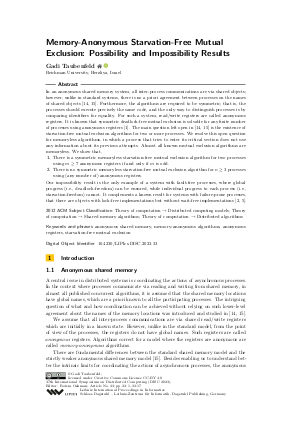Memory-Anonymous Starvation-Free Mutual Exclusion: Possibility and Impossibility Results
Author
Gadi Taubenfeld 
-
Part of:
Volume:
37th International Symposium on Distributed Computing (DISC 2023)
Part of: Series: Leibniz International Proceedings in Informatics (LIPIcs)
Part of: Conference: International Symposium on Distributed Computing (DISC) - License:
 Creative Commons Attribution 4.0 International license
Creative Commons Attribution 4.0 International license
- Publication Date: 2023-10-05
File

PDF
LIPIcs.DISC.2023.33.pdf
- Filesize: 0.71 MB
- 17 pages
Document Identifiers
Subject Classification
ACM Subject Classification
- Theory of computation → Distributed computing models
- Theory of computation → Shared memory algorithms
- Theory of computation → Distributed algorithms
Keywords
- anonymous shared memory
- memory-anonymous algorithms
- anonymous registers
- starvation-free mutual exclusion
Metrics
- Access Statistics
-
Total Accesses (updated on a weekly basis)
0PDF Downloads0Metadata Views
Abstract
In an anonymous shared memory system, all inter-process communications are via shared objects; however, unlike in standard systems, there is no a priori agreement between processes on the names of shared objects [G. Taubenfeld, 2017; G. Taubenfeld, 2022]. Furthermore, the algorithms are required to be symmetric; that is, the processes should execute precisely the same code, and the only way to distinguish processes is by comparing identifiers for equality. For such a system, read/write registers are called anonymous registers. It is known that symmetric deadlock-free mutual exclusion is solvable for any finite number of processes using anonymous registers [Z. Aghazadeh et al., 2019]. The main question left open in [G. Taubenfeld, 2017; G. Taubenfeld, 2022] is the existence of starvation-free mutual exclusion algorithms for two or more processes. We resolve this open question for memoryless algorithms, in which a process that tries to enter its critical section does not use any information about its previous attempts. Almost all known mutual exclusion algorithms are memoryless. We show that, 1) There is a symmetric memoryless starvation-free mutual exclusion algorithm for two processes using m ≥ 7 anonymous registers if and only if m is odd. 2) There is no symmetric memoryless starvation-free mutual exclusion algorithm for n ≥ 3 processes using (any number of) anonymous registers. Our impossibility result is the only example of a system with fault-free processes, where global progress (i.e., deadlock-freedom) can be ensured, while individual progress to each process (i.e., starvation-freedom) cannot. It complements a known result for systems with failure-prone processes, that there are objects with lock-free implementations but without wait-free implementations [H. Attiya et al., 2022; M. Herlihy, 1991].
Cite As Get BibTex
Gadi Taubenfeld. Memory-Anonymous Starvation-Free Mutual Exclusion: Possibility and Impossibility Results. In 37th International Symposium on Distributed Computing (DISC 2023). Leibniz International Proceedings in Informatics (LIPIcs), Volume 281, pp. 33:1-33:17, Schloss Dagstuhl – Leibniz-Zentrum für Informatik (2023)
https://doi.org/10.4230/LIPIcs.DISC.2023.33
BibTex
@InProceedings{taubenfeld:LIPIcs.DISC.2023.33,
author = {Taubenfeld, Gadi},
title = {{Memory-Anonymous Starvation-Free Mutual Exclusion: Possibility and Impossibility Results}},
booktitle = {37th International Symposium on Distributed Computing (DISC 2023)},
pages = {33:1--33:17},
series = {Leibniz International Proceedings in Informatics (LIPIcs)},
ISBN = {978-3-95977-301-0},
ISSN = {1868-8969},
year = {2023},
volume = {281},
editor = {Oshman, Rotem},
publisher = {Schloss Dagstuhl -- Leibniz-Zentrum f{\"u}r Informatik},
address = {Dagstuhl, Germany},
URL = {https://drops.dagstuhl.de/entities/document/10.4230/LIPIcs.DISC.2023.33},
URN = {urn:nbn:de:0030-drops-191599},
doi = {10.4230/LIPIcs.DISC.2023.33},
annote = {Keywords: anonymous shared memory, memory-anonymous algorithms, anonymous registers, starvation-free mutual exclusion}
}
Author Details
References
-
Z. Aghazadeh, D. Imbs, M. Raynal, G. Taubenfeld, and Ph. Woelfel. Optimal memory-anonymous symmetric deadlock-free mutual exclusion. In Proceedings of the 38th ACM Symposium on Principles of Distributed Computing, PODC '19, pages 157-166, 2019.

-
H. Attiya, A. Castañeda, D. Hendler, and M. Perrin. Separating lock-freedom from wait-freedom at every level of the consensus hierarchy. Journal of Parallel and Distributed Computing, 163:181-197, 2022. Conf. version appeared in PODC 2018.

-
J. N. Burns and N. A. Lynch. Bounds on shared-memory for mutual exclusion. Information and Computation, 107(2):171-184, December 1993.

-
E. W. Dijkstra. Solution of a problem in concurrent programming control. Communications of the ACM, 8(9):569, 1965.

-
M. Herlihy. Impossibility results for asynchronous PRAM. In Proc. of the 3rd Annual ACM Symp. on Parallel Algorithms and Architectures, pages 327-336, 1991.

-
M. P. Herlihy. Wait-free synchronization. ACM Trans. on Programming Languages and Systems, 13(1):124-149, January 1991.

-
M. P. Herlihy and J. M. Wing. Linearizability: a correctness condition for concurrent objects. ACM Trans. on Programming Languages and Systems, 12(3):463-492, 1990.

-
L. Lamport. A new solution of Dijkstra’s concurrent programming problem. Communications of the ACM, 17(8):453-455, August 1974.

-
S. Rashid, G. Taubenfeld, and Z. Bar-Joseph. The epigenetic consensus problem. In 28nd International Colloquium on Structural Information and Communication Complexity (SIROCCO 2021), pages 146-163, June 2021. LNCS 12810.

-
M. Raynal and G. Taubenfeld. Symmetry and anonymity in shared memory concurrent systems. Bulletin of the European Association of Theoretical Computer Science (EATCS), 136, 2022. 17 pages.

-
M. Raynal and G. Taubenfeld. A visit to mutual exclusion in seven dates. Theoretical Computer Science, 919:47-65, June 2022.

-
E. Styer and G. L. Peterson. Tight bounds for shared memory symmetric mutual exclusion problems. In Proc. 8th ACM Symp. on Principles of Distributed Computing, pages 177-191, August 1989.

-
G. Taubenfeld. Synchronization Algorithms and Concurrent Programming. Pearson / Prentice-Hall, 2006. ISBN 0-131-97259-6, 423 pages.

-
G. Taubenfeld. Coordination without prior agreement. In Proceedings of the ACM Symposium on Principles of Distributed Computing, PODC '17, pages 325-334, 2017.

-
G. Taubenfeld. Anonymous shared memory. J. ACM, 69(4):1?30, August 2022.

